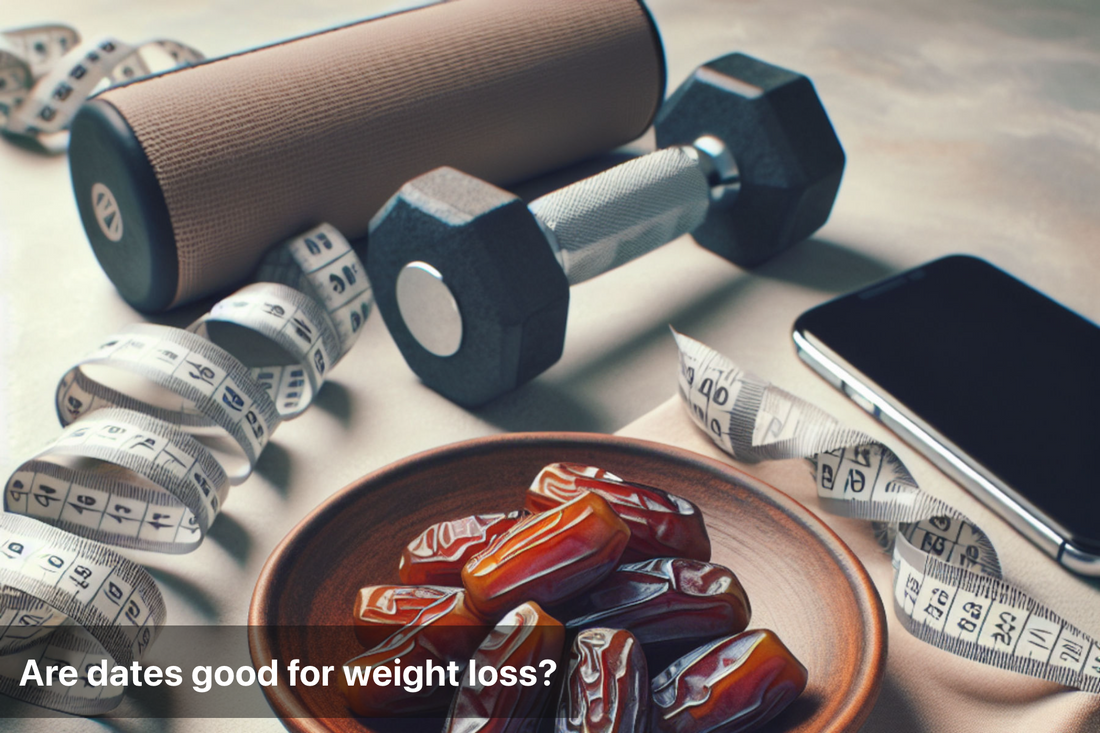
Are dates good for weight loss?
Share
Dates are a sweet, nutrient-rich fruit that has been enjoyed for thousands of years, particularly in Middle Eastern cultures. These small, chewy treats are often mistakenly categorized solely as a dessert or snack, but they pack a powerful nutritional punch. A single date contains essential vitamins and minerals, including potassium, magnesium, and vitamin B6, along with a good amount of dietary fiber.
You might wonder, "Are dates good for weight loss?" While they are high in natural sugars, which may raise concerns about their suitability for calorie-conscious diets, they can actually fit into a balanced eating plan. Their fiber content helps keep you full, reducing the likelihood of overeating.
Common misconceptions about dates often revolve around their sugar content and caloric value. Some people believe that consuming dates will lead to significant weight gain, but when enjoyed as part of a balanced diet, they can be beneficial snacks. Understanding their nutritional profile can help you make informed choices—whether you're aiming for weight loss or considering dates for weight gain.
Nutritional Benefits of Dates
"Dates are nature's sweet treat—packed with fiber and nutrients, they satisfy cravings while supporting mindful weight management." suggests Health Coach Neha Singh (M.Sc - dietetics & food service management)
Dates are not only delicious but also pack a substantial nutritional punch. Here is a nutritional benefits table for dates (based on a 100-gram serving of Medjool dates):
Nutrient |
Amount per 100g |
% Daily Value (DV) (Approx.) |
|---|---|---|
Calories |
277 kcal |
14% |
Carbohydrates |
75 g |
25% |
Dietary Fiber |
6.7 g |
24% |
Protein |
1.8 g |
4% |
Total Fat |
0.2 g |
<1% |
Potassium |
696 mg |
20% |
Magnesium |
54 mg |
13% |
Calcium |
64 mg |
5% |
Iron |
0.9 mg |
5% |
Vitamin B6 |
0.2 mg |
15% |
Folate (B9) |
15 µg |
4% |
Antioxidants |
High |
- |
Natural Sugars |
66.5 g |
- |
Sodium |
1 mg |
<1% |
Dates are nutrient-dense, offering energy, fiber, and essential vitamins and minerals. When consumed in moderation, they can be part of a healthy diet.
How Dates Can Aid Weight Loss
Incorporating dates into a weight loss diet can be both enjoyable and beneficial. Here are why dates can aid weight loss:
Rich in Fiber: Dates contain a significant amount of fiber, which helps improve digestion, reduce hunger, and promote feelings of fullness, preventing overeating.
Low in Fat: Dates are virtually fat-free, making them a healthy, nutrient-dense snack that can fit into a weight-loss diet without adding unnecessary calories.
Natural Sweetener: Dates provide a natural source of sugar, offering a healthier alternative to refined sugars, reducing cravings for unhealthy sweets and processed snacks.
Sustained Energy: Due to their high carbohydrate content, dates provide a quick energy boost, which can help maintain an active lifestyle and prevent energy dips that lead to overeating.
Low Glycemic Index: Dates have a low glycemic index, meaning they cause a slower rise in blood sugar levels, helping control hunger and avoid energy crashes.
Helps Control Portion Sizes: The natural sweetness and fiber content make dates satisfying, helping to curb sugar cravings and reduce overall calorie intake when consumed in moderation.
Incorporating dates into a weight-loss diet can be effective when consumed in moderation as part of a balanced, nutrient-rich diet.
Potential Downsides of Eating Dates
While dates offer numerous health benefits, it’s essential to consider potential downsides, especially regarding their calorie density and sugar content. Here are some potential downsides of eating dates:
High Caloric Content: Dates are calorie-dense, with 277 calories per 100 grams. Eating them in large quantities could lead to an excess in calorie intake, potentially hindering weight loss efforts.
High Sugar Content: Dates are rich in natural sugars (about 66.5g per 100g), which, although healthier than refined sugar, can still contribute to blood sugar spikes when consumed excessively, especially for people with diabetes.
Overconsumption Risk: Due to their sweet taste and chewy texture, it’s easy to overeat dates, which could lead to an unbalanced diet or unnecessary calorie consumption.
Digestive Issues: While dates are high in fiber, consuming too many in one sitting can lead to bloating, gas, or stomach discomfort, especially for those who are not used to a high-fiber diet.
Dental Health Concerns: Dates are sticky and dense, which can increase the risk of tooth decay if they remain stuck to teeth for prolonged periods. It's important to brush teeth after eating them.
Possible Allergies: Some individuals may have an allergy or sensitivity to dates, which could lead to symptoms like itching, swelling, or digestive issues.
Not Suitable for Low-Carb Diets: Dates are relatively high in carbohydrates, making them unsuitable for strict low-carb diets like keto.
Moderation is key when consuming dates, as they offer health benefits but can also lead to drawbacks if overeaten.
Should You Include Dates in Your Weight Loss Plan?
Dates are a versatile fruit that can fit into both weight loss and weight gain diets, depending on how they are consumed. They boast a rich nutritional profile, providing essential vitamins, minerals, and a substantial amount of fiber. This high fiber content can promote feelings of fullness, making dates a great addition to a weight loss plan.
However, moderation is key. While they are nutrient-dense, dates also carry a higher calorie count and a significant amount of natural sugars. For individuals aiming to gain weight, incorporating dates into meals can be beneficial due to their energy density.
It's essential to tailor your date consumption based on your dietary goals. Are dates good for weight loss? Yes, when eaten mindfully and in appropriate portions. On the other hand, if you're looking for ways to gain weight, dates can serve as an effective tool. Ultimately, awareness of your total calorie intake and goals should guide your relationship with this sweet, nourishing fruit.


